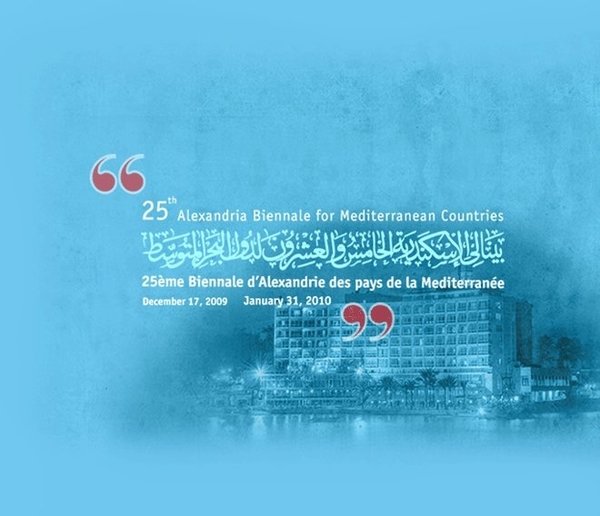Aftermath
dal 16/12/2009 al 30/1/2010
Segnalato da
Mohammed Abul-Naga
Walid Raad
Lalla Essaydi
Venera Kastrati
Michelangelo Pistoletto
Suha Shoman
Alessandro Scarabello
Mohammad Abou El Naga
16/12/2009
Aftermath
Egyptian Ministry of Culture Sector of Fine Arts, Cairo
Questa 25ma edizione e a cura di Mohammed Abul-Naga e propone artisti come Walid Raad, Lalla Essaydi e Venera Kastrati, mentre Michelangelo Pistoletto e Suha Shoman, sono ospiti d'onore della rassegna. Tutti gli invitati sono stati chiamati ad interrogarsi su quale evoluzione potra' conoscere l'area del Mediterraneo, culla da millenni di ogni forma di arte e cultura, alla luce dei profondi mutamenti in atto dei valori etici, morali, religiosi, politici, demografici e culturali.

"The Alexandria Biennial for Mediterranean countries is one of the leading art events in the world. In the beginning, it was visioned to make each of its editions travel in a different Mediterranean country until it was finally settled to always organize it in the city of Alexandria for its historical heritage as the old capital of Egypt in ancient times.
The first edition of Alexandria Biennial was inaugurated in the 26th of July, 1955 by the name of "The First Biennial for the Arts of Mediterranean Countries"and it was held in the Alexandria Museum of Fine Arts where the Biennial is still based till nowadays. The aim of the Alexandria Biennial is to fortify the cultural and artistic dialog not only between Egypt and its neighboring Mediterranean countries but to extend it all over the world as well. This year, the Alexandria Biennial celebrates its 25th edition that aims to be a panoramic view of the latest in artistic creativity coming from our region"
If the challenge of the existence, the certainty of the distinctive entity and the common attributes to groups of people, ethnically or geographically, have always played a major role in the forms of domination, the distribution of global power and the occasional rearrangement of the geographical map. And if these types of challenges play a key role in shaping the structures of different peoples and their tools to demonstrate themselves, even these personal ambitions of the humankind and his common and dissonant characteristics with the other; so to what extent the new challenges that the world faces, have affected the attributes of the Mediterranean region? Were they able to change geographically the aspects of historical affiliations of the Mediterranean? And to what extent?The Mediterranean region, with its two shores, was one of the most important focal points of human evolution for what it has witnessed of religious and spiritual intersections as well as its real contribution to the birth of science. The specificity of this region and its civilizations have created a multitude of artistic excellence that made it a center point of cultural radiation that imposed on history several creative elements that have had a major role in the dialogue between different art forms. However, these common attributes didn't prevent great changes over the course of history in the levels of power and the alteration of its civilizations center points according to the changes of humankind interest and the values that control its ambitions.
Even the oration of globalization has impacted on the lives humankind until it was about to eliminate the privacy bringing corners of the globe into one vessel where power is the dominant effect for control and where unforeseen and intangible forces take effect.
Is this shift has actually taken place from the physical (geographical, historical and productive) into the moral (change of the form of interest, methods and the possibilities of communication)?
To what extent the new challenges have played a role in the changing of the human being who is geographically belonging to the Mediterranean? Are these historical and spatial elements still playing that role in the formation of human values and aspirations? Did the affiliation of human being change into other more complicated forms than those communions with the others? Or did the new cultural values, which engage him with the other geographical areas, qualitatively and morally than the traditional and ethnic geographical ties, form his personality, his future and his interests and future, or moreover his capabilities?
The inquiry that evokes itself now, amidst all these changes in the future of the region, and the whole world is: The Aftermath
What's next for these new growing crises for nowadays' power? What's next for these major economic collapses from the east to west? What will be the new shape of dependent economic systems in the aftermath of these successive collapses? Is there a place to search for human happiness and to improve his quality of living? Will the real needs of humans be ignored in favor of new metaphysical forces?
What will be the aftermaths of those theses which were attested in contemporary art events and the reign of new media on the artistic creativity in all the forums and worldwide biennials, which sometimes reflected a culture of ambiguousness and which ignored the traditional techniques carrying the creativity and visions of artists for many years?
Therefore, the Alexandria Biennale is realizing through its selections a balance between different practices with profound concepts and expressions.
Mohamed Abouelnaga
Commissaire General of the 25th Alexandria Biennale for Mediterranean Countries
Egyptian Ministry of Culture Sector of Fine Arts
1 Kafour Street, Orman Post, Cairo, Egypt



